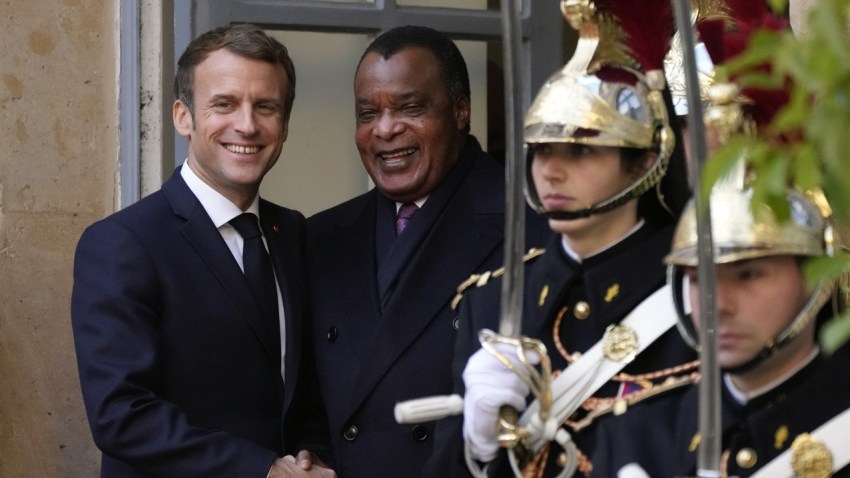But Sassou Nguesso and the PCT face little domestic political accountability, in part because the regime maintains absolute control over the security forces, while also detaining—or forcing into exile—most major political rivals. In two of the most brazen incidents, two candidates who ran against Sassou Nguesso in the 2016 election were subsequently arrested on charges of threatening state security and sentenced to 20 years of hard labor. The regime is also quick to deploy force. When violent protests broke out in the country’s southwest Pool region following Sassou Nguesso’s 2016 presidential victory, security forces hit back with air strikes that destroyed schools, churches and medical facilities, according to Amnesty International. And once in detention, prisoners face brutal conditions, with human rights groups reporting incidents of people being tortured and killed in prisons and pretrial detention centers. That includes the opposition activist Augustin Kala, who died in May 2019 from injuries he suffered while in detention. Ultimately, this campaign of intimidation has created the political conditions for Sassou Nguesso to entrench himself and his party. That includes pushing through a 2015 constitutional referendum that removed presidential age limits and changed term limits, which made Sassou Nguesso eligible to run for a fifth term in 2021. It would also allow him to run yet again in 2026, when he would be 82 years old. The opposition has also undermined itself by resisting calls to unite in strategic opposition to the PCT. Civil society and church groups have continued to advocate for the regime to release political prisoners and guarantee more transparent elections, but they face the same risks of indefinite detention and torture as the political opposition does. In effect, this leaves Congolese citizens with no political channel to express their outrage at the country’s persistent corruption. Nearly 40 percent of the oil-rich country’s wealth lies in the bank accounts of just 10 percent of the population, while more than half of the country’s 5.7 million people live in extreme poverty. Civil society has looked to the international community to help break Sassou Nguesso’s hold on power, but its assistance is rarely forthcoming, and what efforts it does make are halfhearted at best. In the highest-profile case, U.S. and French prosecutors went after the president’s son, Denis Christel Sassou Nguesso, over assets in their territories that he bought with the tens of millions of dollars he allegedly siphoned from the government. However, the impact of that case has been negligible. Following his last election, the elder Sassou Nguesso tapped Denis Christel to head the newly created Ministry of International Cooperation and Public-Private Partnership, and there are even rumors that he is setting up his son to replace him if he ever steps down. Beyond probes into corruption scandals, the West has largely ignored Congo-Brazzaville’s ongoing political repression. France, in particular, has largely kept quiet on the mounting brutality in its former colony, joining other countries in neglecting calls from Congolese rights groups to impose sanctions against perpetrators of torture or to go after embezzled wealth more proactively. Meanwhile, Sassou Nguesso’s partnership with China has protected him from any worse repercussions. In return for his fealty, Beijing has tamped down any scrutiny of the Congo-Brazzaville’s rights record, while also helping the country avoid any fallout from the president’s economic policies. In June 2021, the Chinese government agreed to restructure the Republic of Congo’s $2.4 billion in debt, which paved the way for the country to access an International Monetary Fund lending program worth $455 million to aid its recovery from the COVID-19 pandemic. Thanks to the current geopolitical climate, it is even less likely now that Sassou Nguesso’s regime will be held to account on an international stage. At a moment when Europe is agonizing over the potential loss of Russian natural gas, the EU is desperate for alternative energy suppliers and is eyeing the Republic of Congo’s untapped oil and natural gas supplies. Brazzaville has already signed an agreement with Italy to allow an Italian multinational to expand its gas production within its borders. And Sassou Nguesso has signaled a willingness to offer generous terms to other countries and companies looking to explore. If history is an indicator, it is clear who will benefit from those deals.Sassou Nguesso faces little domestic political accountability, in part because the regime maintains absolute control over the security forces, while also detaining—or forcing into exile—most major political rivals.
Andrew Green is a freelance journalist based in Berlin. He writes regularly about health and human rights issues. You can view more of his work at www.theandrewgreen.com.

